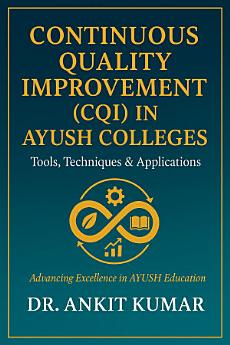Continuous Quality Improvement (CQI) in AYUSH Colleges: Tools, Techniques & Applications
About this ebook
In an era when global education and healthcare systems are rapidly aligning with quality benchmarks, the AYUSH sector comprising Ayurveda, Yoga, Unani, Siddha, and Homeopathy cannot remain outside the framework of Continuous Quality Improvement (CQI). Accreditation, accountability, and measurable outcomes are no longer optional; they are essential for positioning AYUSH institutions on national and international platforms of excellence.
This groundbreaking book, Continuous Quality Improvement in AYUSH Colleges, is the first comprehensive blueprint designed specifically for the unique challenges and opportunities of AYUSH higher education and clinical governance. Structured into 33 meticulously curated chapters, it bridges the gap between global quality management systems and the indigenous ethos of AYUSH institutions.
The book begins with the foundations of CQI, exploring the evolution of quality systems, the Deming Cycle (PDCA), and the adaptation of continuous improvement models to higher education. It then progresses into advanced quality improvement tools such as:
Root Cause Analysis (RCA) with the “5 Whys,” causal tree tool, and the “Five Rules of Causation.”
Failure Modes and Effects Analysis (FMEA) and its healthcare-specific counterpart, HFMEA.
Fault Tree Analysis (FTA) for mapping systemic breakdowns.
Six Sigma methodologies contrasting DMAIC (Define, Measure, Analyze, Improve, Control) with DMADV (Define, Measure, Analyze, Design, Verify) to ensure precision in institutional processes.
Decision tables and process audits for robust troubleshooting.
Beyond technical tools, the book places AYUSH-specific applications at its core. It shows how CQI can be applied to:
Academic Quality: Outcome-Based Education (OBE), competency mapping using Bloom’s and Miller’s Taxonomy, faculty development, and NEP 2020 alignment.
Clinical Services: Strengthening OPD/IPD records, improving patient safety, integrating pharmacovigilance of Ayurvedic and herbal drugs, and enhancing hospital management systems.
Research Ecosystems: Building reproducible, ethically sound, and quality-monitored research frameworks for AYUSH therapies.
Governance & Accreditation: Preparing institutions for QCI, NABH, NAAC, and NCH standards with templates, SOPs, and monitoring systems.
Each chapter is supported with case studies, flowcharts, and practical templates, making the content not only conceptual but also implementable. The inclusion of CQI tools adapted to AYUSH realities makes this book a one-of-a-kind manual relevant for principals, deans, administrators, quality officers, faculty leaders, and policymakers.
What makes this work unique is its dual vision:
To embed scientific rigor and accountability in AYUSH institutions.
To preserve and elevate the holistic, patient-centered philosophy that defines traditional systems of medicine.
By combining industry-grade quality frameworks with academic and clinical realities of AYUSH, this book offers a roadmap for sustainable excellence. It emphasizes that quality is not a one-time accreditation event but a culture of continuous improvement a mindset where every faculty member, every clinician, and every student contributes to the institution’s growth.
Whether you are preparing for institutional accreditation, curriculum reforms or research evaluation, this book equips you with the knowledge, tools, and strategies needed to succeed.
For the AYUSH sector, the challenge of the 21st century is not only to preserve tradition but to prove quality, efficiency, and outcomes at par with global benchmarks. Continuous Quality Improvement in AYUSH Colleges ensures that your institution is prepared not just to participate, but to lead in this global movement of academic and healthcare excellence.
About the author
Dr Ankit Kumar is a physician-researcher, educator, and author redefining the future of evidence-based Ayurveda. He is recognized for integrating classical Ayurvedic principles with modern medical and neuroscientific insight.
A prolific researcher and writer, Dr Kumar has authored over 30 books and 27 research papers, alongside developing multiple intellectual property rights (more than four IPRs) including copyrights and design patents.
His pioneering work on diabetic neuropathy bridging the gap between traditional healing and biomedical validation.
Recipient of several national honors-including the Rashtra Sewa Puraskar (2025) and the National Talent Award (2025)-Dr Kumar is widely respected for his contributions to integrative medicine, clinical innovation, and academic reform.
He continues to inspire students, physicians, and readers to see health as a union of discipline, science, and consciousness.




